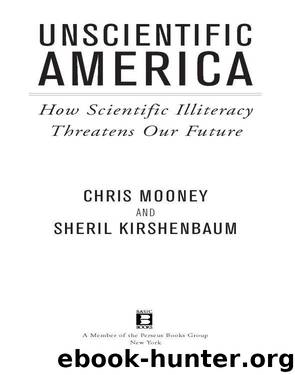Unscientific America by Chris Mooney

Author:Chris Mooney
Language: eng
Format: epub
Publisher: Basic Books
Published: 2010-05-04T16:00:00+00:00
The problem with the New Atheism, however, isn’t just that it’s divisive or historically incorrect about the relationship between science and religion. It’s also misguided about the nature of science. To understand why we say this, it’s essential to understand the scope and evidentiary basis of scientific inquiry.
Modern science relies on the systematic collection of data through observation and experimentation, the development of theories to organize and explain this evidence, and the use of professional institutions and norms such as peer review to subject claims to scrutiny and ultimately (it is hoped) develop reliable knowledge. A core principle underlying this approach is something called “methodological naturalism,” which stipulates that scientific hypotheses are tested and explained solely by reference to natural causes and events. Crucially, methodological naturalism is not the same thing as philosophical naturalism—the idea that all of existence consists of natural causes and laws, period. Methodological naturalism in no way rules out the possibility of entities or causes outside of nature; it simply stipulates that they will not be considered within the framework of scientific inquiry. As Michigan State University science philosopher Robert Pennock put it in his testimony at the Dover, Pennsylvania, evolution trial in 2005, we’re talking here about a “method that constrains what counts as a scientific explanation.” It is very clear today, Pennock noted, that “when one does science, one is setting aside questions about whether the gods or some supernatural beings had some hand in this.”
The critical point is that such naturalism, being merely methodological in nature, is not a claim about the fundamental reality of the world. And it certainly is not atheism. Rather, it’s simply a rule that is justified on pragmatic grounds by the dramatic success it has facilitated in the application of scientific knowledge to real-world situations. Anti-evolutionists have long sought to slander the scientific enterprise by claiming it’s inherently atheistic, but in so doing, they misunderstand both the history and the philosophy of science. Or as Pennock amusingly puts it: “Science is godless in the same way that plumbing is godless.”
But much like anti-evolutionists do, the New Atheists often seek to collapse the distinction between methodological and philosophical naturalism. In The God Delusion, for instance, Richard Dawkins makes the dubious claim that the existence of God is, as he puts it, “unequivocally a scientific question.” Quite a lot of philosophers—and scientists—would disagree. It is one thing to say that scientific norms and practices preclude ascribing any explanatory force to God in, say, the movement of atoms, or the functioning of DNA. It’s quite another to claim science can in some way resolve the debate over God’s existence. In rejecting God or any other supernatural entity, Dawkins is taking a philosophical position. He has every right to it, of course. But to pretend that there is something inherent in science that requires him to do so is an intellectual error at best—and at worst, a nasty bullying tactic.
Download
This site does not store any files on its server. We only index and link to content provided by other sites. Please contact the content providers to delete copyright contents if any and email us, we'll remove relevant links or contents immediately.
Enlightenment Now: The Case for Reason, Science, Humanism, and Progress by Steven Pinker(7306)
A Journey Through Charms and Defence Against the Dark Arts (Harry Potter: A Journey Through…) by Pottermore Publishing(4810)
The Immortal Life of Henrietta Lacks by Rebecca Skloot(4578)
A Journey Through Divination and Astronomy by Publishing Pottermore(4379)
Elon Musk by Ashlee Vance(4121)
Origin Story: A Big History of Everything by David Christian(3687)
COSMOS by Carl Sagan(3617)
Alchemy and Alchemists by C. J. S. Thompson(3516)
Bad Pharma by Ben Goldacre(3422)
Enlightenment Now by Steven Pinker(3367)
Shadow of Night by Deborah Harkness(3360)
Inferior by Angela Saini(3311)
A Mind For Numbers: How to Excel at Math and Science (Even If You Flunked Algebra) by Barbara Oakley(3302)
Origin Story by David Christian(3194)
The Code Book by Simon Singh(3179)
Signature in the Cell: DNA and the Evidence for Intelligent Design by Stephen C. Meyer(3131)
The Elements by Theodore Gray(3050)
A Brief History of Time by Stephen Hawking(3022)
A Journey Through Potions and Herbology (A Journey Through…) by Pottermore Publishing(2849)
